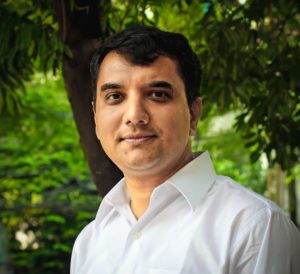Covid-19 is having a devastating impact on communities around the world. In this Q&A, Hossain Ishrath Adib, our Head of Programme Implementation and Programme Delivery in Bangladesh explains the impact on the ground and Practical Action’s response.

Hossain Ishrath Adib, Head of Programme Implementation and Programme Delivery in Bangladesh
What’s the current situation in Bangladesh?
Like most other countries, covid-19 has struck Bangladesh and the first case was identified in early March. There have now been over 15,000 cases, so we are on the rising segment of the curve. The situation is getting tough, and as you would expect, it will have severe implications on the economy.
We are not in absolute lockdown but certain areas have been locked down, shops are closed and businesses are on hold so we see the economy on a downward spiral. Recent surveys show that within a few weeks, an additional 40% of the population has just slipped into poverty. Also, as you’d expect, Bangladesh being such a densely populated country, hosting about 170 million people, managing covid-19 is going to be a tremendous challenge. It will have a tremendous burden on the health system, the service providers and the government as a whole.
How are people feeling?
Fear, sorrow, anxiety. Bangladesh is a disaster prone country and we have experience with flooding, cyclones, storms, things like that. But we’re dealing with an invisible enemy with an unknown magnitude. It’s challenging to deal with, especially for those in the low income communities.
Have any of our previous projects helped during the outbreak? Especially in the area of food security?
In the northern parts of Bangladesh, in the sandbar areas, for the last 11-12 years, Practical Action has been instrumental in terms of coming up with the ingenious idea of growing pumpkins on the sandbars, something which hadn’t been tried or thought of in the past. Now, thousands of farmers have the technical know-how to grow pumpkins on that once barren land. They also have access to the local markets, even the national markets so they are part of a very important supply chain.
Producing pumpkins in the sandbar areas is also significant within the context of coronavirus. The virus has a detrimental impact on the production system and the whole economy and there is a potential risk to food security, especially the north which has historically been vulnerable to food insecurity. Now, thousands of farmers are growing hundreds and tonnes of pumpkins which are addressing the food security problem. This is really reassuring on our part. Even in a crisis, the farmers are still harvesting large volumes of pumpkins. There is still the challenge of transportation disrupting the supply chain and a risk that farmers will not get a good price for their produce but communities will not be food insecure during this time.
Can you talk about the communities that we’re working with in some of the really densely populated areas – especially informal settlements – and what the impact is going to be on them?
We’re working in several slum areas, in 10 municipalities. And in the slum areas, people are living in cramped conditions with shared facilities. They’re all low income households, depending on their daily wages and activities which they’re carrying out. It’s an even greater challenge for these communities in the slum areas, because social distancing and good hygiene behaviour is not something that’s easy to maintain. At the same time, they’re facing the dilemma – a struggle between life versus livelihood. If they isolate themselves and maintain social distancing, they are not able to go to work. There isn’t enough help available – for a long period of time – which would sustain them.
What kind of support is Practical Action giving to those communities?
We have been supporting 1100 informal waste and sanitation workers by supplying safety and security equipment like gloves, masks, goggles, boots etc. so that they can carry out their essential services safely. For the Rohingya communities, Practical Action is responsible for supplying water for a settlement of around 25,000. This is an essential service and we have continued providing that, but it is something which we are managing and supervising remotely. In five other camps, we are managing sewage/human waste which is also an essential service which we’re continuing to carry out.
Have we seen many cases of coronavirus in the camps where we work? What’s the scale of the problem?
We have been lucky so far in the camps we work in. We haven’t actually heard of reported cases, a few suspected cases but not confirmed. In nearby locations, there have been a few, but the number is much lower than the bigger towns or cities. As of now in Bangladesh, coronavirus cases are concentrated in city areas.
If coronavirus gets to those refugee camps, what is going to be the impact of that?
The impact is going to be immense because we are talking about a population of 1.5 million people crammed in a small geographic location. It would be an enormous burden on the system, the infrastructure, and the support facilities. There is no alternative to prevention. All the NGOs, the government, Practical Action, have been doing as much as possible to make sure that there is no spread inside the camp. But in the unfortunate event that it happens, there are some facilities for isolation, but to be very honest, we don’t know what would be the capacity in the case of a large outbreak.
To learn more about our response to the pandemic, view our latest update here.